Aashaka Shah
MSCCL++: Rethinking GPU Communication Abstractions for Cutting-edge AI Applications
Apr 11, 2025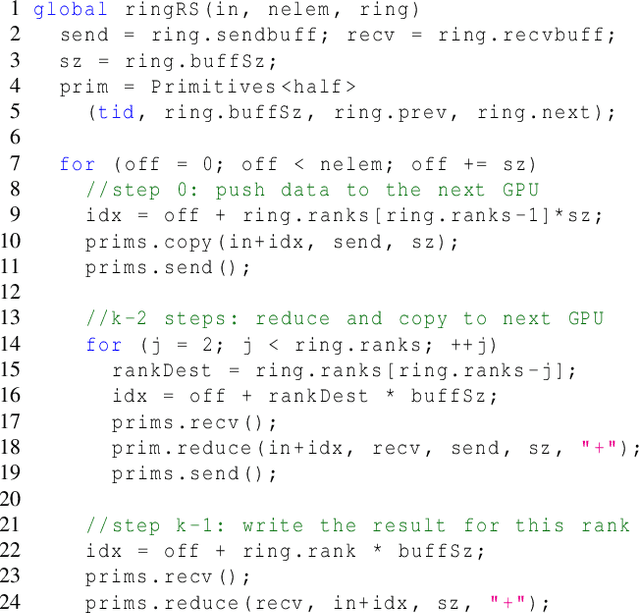

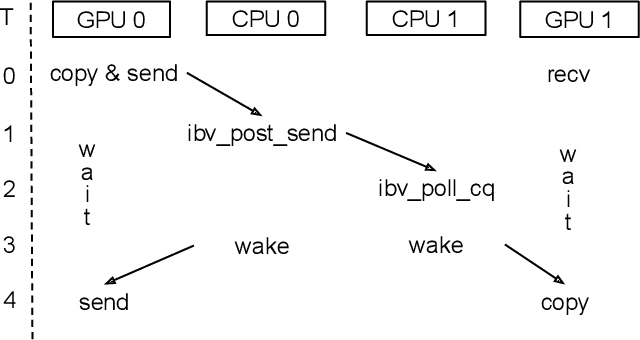
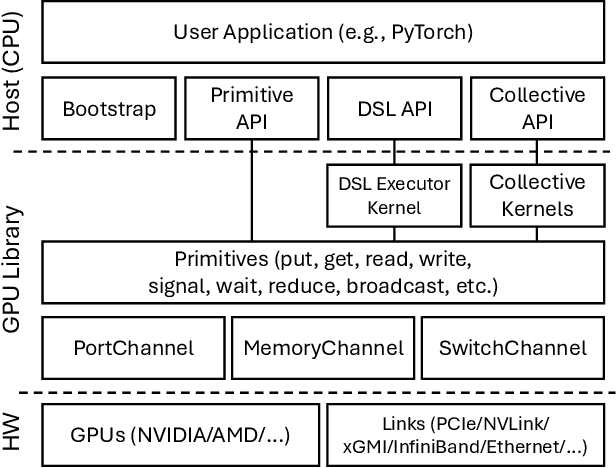
Abstract:Modern cutting-edge AI applications are being developed over fast-evolving, heterogeneous, nascent hardware devices. This requires frequent reworking of the AI software stack to adopt bottom-up changes from new hardware, which takes time for general-purpose software libraries. Consequently, real applications often develop custom software stacks optimized for their specific workloads and hardware. Custom stacks help quick development and optimization, but incur a lot of redundant efforts across applications in writing non-portable code. This paper discusses an alternative communication library interface for AI applications that offers both portability and performance by reducing redundant efforts while maintaining flexibility for customization. We present MSCCL++, a novel abstraction of GPU communication based on separation of concerns: (1) a primitive interface provides a minimal hardware abstraction as a common ground for software and hardware developers to write custom communication, and (2) higher-level portable interfaces and specialized implementations enable optimization for different hardware environments. This approach makes the primitive interface reusable across applications while enabling highly flexible optimization. Compared to state-of-the-art baselines (NCCL, RCCL, and MSCCL), MSCCL++ achieves speedups of up to 3.8$\times$ for collective communication and up to 15\% for real-world AI inference workloads. MSCCL++ is in production of multiple AI services provided by Microsoft Azure, and is also adopted by RCCL, the GPU collective communication library maintained by AMD. MSCCL++ is open-source and available at https://github.com/microsoft/mscclpp.
ForestColl: Efficient Collective Communications on Heterogeneous Network Fabrics
Feb 09, 2024



Abstract:As modern DNN models grow ever larger, collective communications between the accelerators (allreduce, etc.) emerge as a significant performance bottleneck. Designing efficient communication schedules is challenging given today's highly diverse and heterogeneous network fabrics. In this paper, we present ForestColl, a tool that generates efficient schedules for any network topology. ForestColl constructs broadcast/aggregation spanning trees as the communication schedule, achieving theoretically minimum network congestion. Its schedule generation runs in strongly polynomial time and is highly scalable. ForestColl supports any network fabrics, including both switching fabrics and direct connections, as well as any network graph structure. We evaluated ForestColl on multi-cluster AMD MI250 and NVIDIA A100 platforms. ForestColl's schedules achieved up to 52\% higher performance compared to the vendors' own optimized communication libraries, RCCL and NCCL. ForestColl also outperforms other state-of-the-art schedule generation techniques with both up to 61\% more efficient generated schedules and orders of magnitude faster schedule generation speed.
Synthesizing Collective Communication Algorithms for Heterogeneous Networks with TACCL
Nov 15, 2021



Abstract:Large ML models and datasets have necessitated the use of multi-GPU systems for distributed model training. To harness the power offered by multi-GPU systems, it is critical to eliminate bottlenecks in inter-GPU communication - a problem made challenging by the heterogeneous nature of interconnects. In this work, we present TACCL, a synthesizer for collective communication primitives for large-scale multi-GPU systems. TACCL encodes a profiled topology and input size into a synthesis problem to generate optimized communication algorithms. TACCL is built on top of the standard NVIDIA Collective Communication Library (NCCL), allowing it to be a drop-in replacement for GPU communication in frameworks like PyTorch with minimal changes. TACCL generates algorithms for communication primitives like Allgather, Alltoall, and Allreduce that are up to $3\times$ faster than NCCL. Using TACCL's algorithms speeds up the end-to-end training of an internal mixture of experts model by $17\%$. By decomposing the optimization problem into parts and leveraging the symmetry in multi-GPU topologies, TACCL synthesizes collectives for up to 80-GPUs in less than 3 minutes, at least two orders of magnitude faster than other synthesis-based state-of-the-art collective communication libraries.
Memory Optimization for Deep Networks
Oct 29, 2020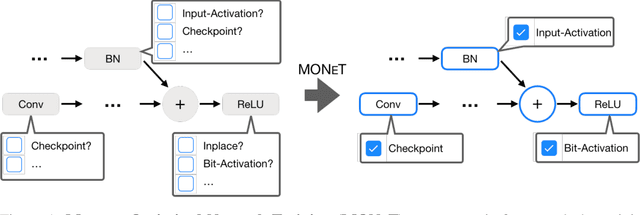

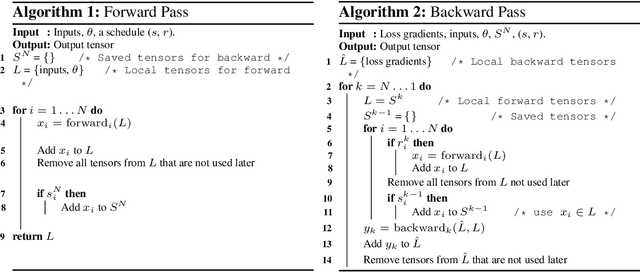

Abstract:Deep learning is slowly, but steadily, hitting a memory bottleneck. While the tensor computation in top-of-the-line GPUs increased by 32x over the last five years, the total available memory only grew by 2.5x. This prevents researchers from exploring larger architectures, as training large networks requires more memory for storing intermediate outputs. In this paper, we present MONeT, an automatic framework that minimizes both the memory footprint and computational overhead of deep networks. MONeT jointly optimizes the checkpointing schedule and the implementation of various operators. MONeT is able to outperform all prior hand-tuned operations as well as automated checkpointing. MONeT reduces the overall memory requirement by 3x for various PyTorch models, with a 9-16% overhead in computation. For the same computation cost, MONeT requires 1.2-1.8x less memory than current state-of-the-art automated checkpointing frameworks. Our code is available at https://github.com/utsaslab/MONeT.
 Add to Chrome
Add to Chrome Add to Firefox
Add to Firefox Add to Edge
Add to Edge